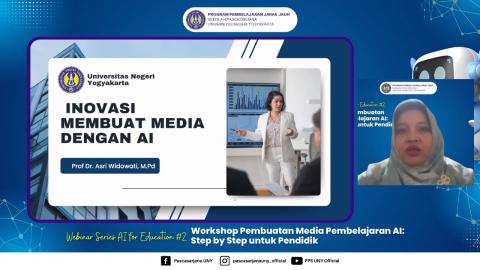You are here
Webinar Series “AI for Education” #2: Workshop on Creating AI-Based Learning Media – Step by Step for Educators

Graduate School of Universitas Negeri Yogyakarta (GS UNY) held an online webinar on Saturday, September 27th, 2025, entitled “Workshop on Creating AI-Based Learning Media: Step by Step for Educators” via Zoom platform. The event was officially opened by Prof. Dr. Siswantoyo, M. Kes., AIFO., who emphasized the spirit of collaboration—“Together we can, through partnership we excel”—and highlighted the role of the Distance Education Laboratory (Laboratorium PJJ) in accelerating the transformation of distance learning.
In his academic introduction, Dr. Ir. Yoga Sahria, S. Kom., M. Kom. explained that the webinar aimed to strengthen educators’ competencies in the era of digital transformation through the effective use of Artificial Intelligence (AI). The core session, led by Prof. Dr. Asri Widowati, S.Pd.Si., M.Pd., from the Faculty of Mathematics and Natural Sciences (FMIPA), explored real-world challenges in media development, design frameworks, and practical workflows for creating AI-assisted learning materials. She emphasized that AI is not a replacement for teachers, but rather a co-pilot that helps accelerate idea generation, maintain consistency, enhance personalization, and automate subtitling and content adaptation—allowing students to learn at their own pace.
The following session sharpened the principles of human-centered AI utilization, reinforcing that teachers must remain “the teacher in the loop”—acting as editors and final decision-makers. Technology should be chosen after defining learning objectives, and the integration of content, pedagogy, and technology must remain aligned. Participants were also provided with ethical and compliance guidelines covering Accessibility, safety, and relevance of tools; Privacy and intellectual property (use of self-created assets, AI disclosure, student data anonymization); and Workflow stages: pedagogical alignment, defining objectives and evidence artifacts, rubric design, selecting modalities and narratives, and crafting prompts based on learning goals and potential misconceptions.
The discussion session was highly interactive, addressing participants’ questions about plagiarism when using AI, how to choose the right AI tools, and the limits of copyright, with clear examples of practical applications.
The organizers reaffirmed the mandate of the GS UNY Distance Education Laboratory as a hub for developing and expanding distance learning that reaches participants across various provinces in Indonesia and abroad. The event concluded with a group photo session and the handing over of a certificate of appreciation to the speakers.

FAKULTAS DI UNY
- Fakultas Ilmu Pendidikan
- Fakultas Bahasa, Seni, dan Budaya
- Fakultas Matematika dan Ilmu Pengetahuan Alam
- Fakultas Ilmu Sosial dan Ilmu Politik
- Fakultas Teknik
- Fakultas Ilmu Keolahragaan dan Kesehatan
- Fakultas Ekonomi dan Bisnis
- Fakultas Vokasi
- Fakultas Psikologi
- Fakultas Hukum
- Fakultas Kedokteran
- Sekolah Pascasarjana
SEKOLAH PASCASARJANA UNY
Kampus Karangmalang, Yogyakarta 55281
Telp. +62274-550836 (front office)
Fax. +62274-520326 Email: pps@uny.ac.id, humas_pps@uny.ac.id
Website : http://sps.uny.ac.id
Copyright © 2026,


